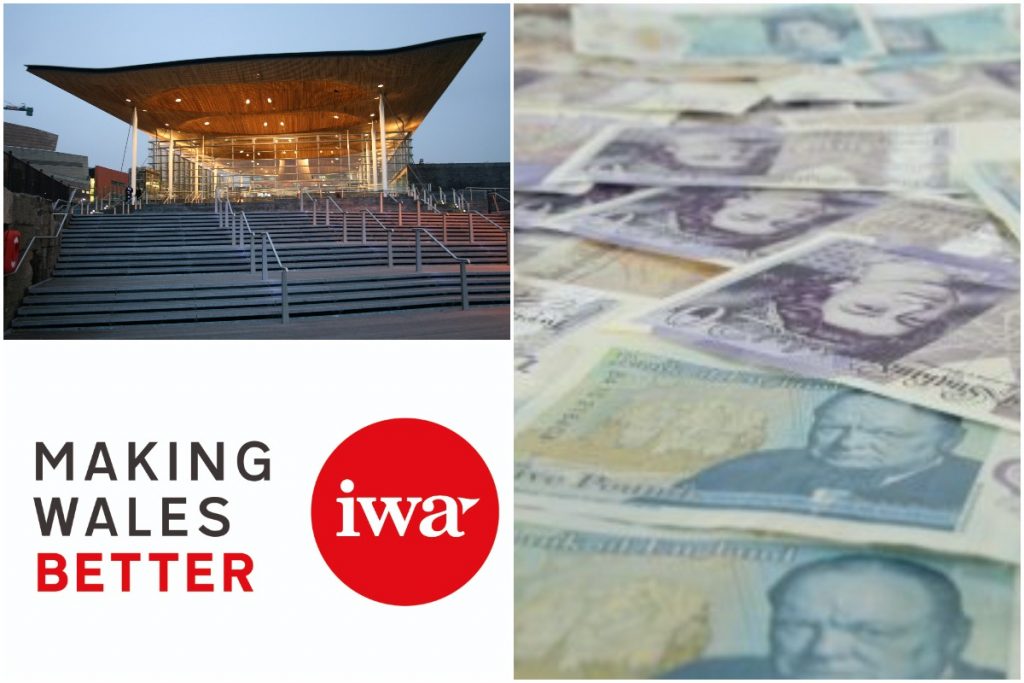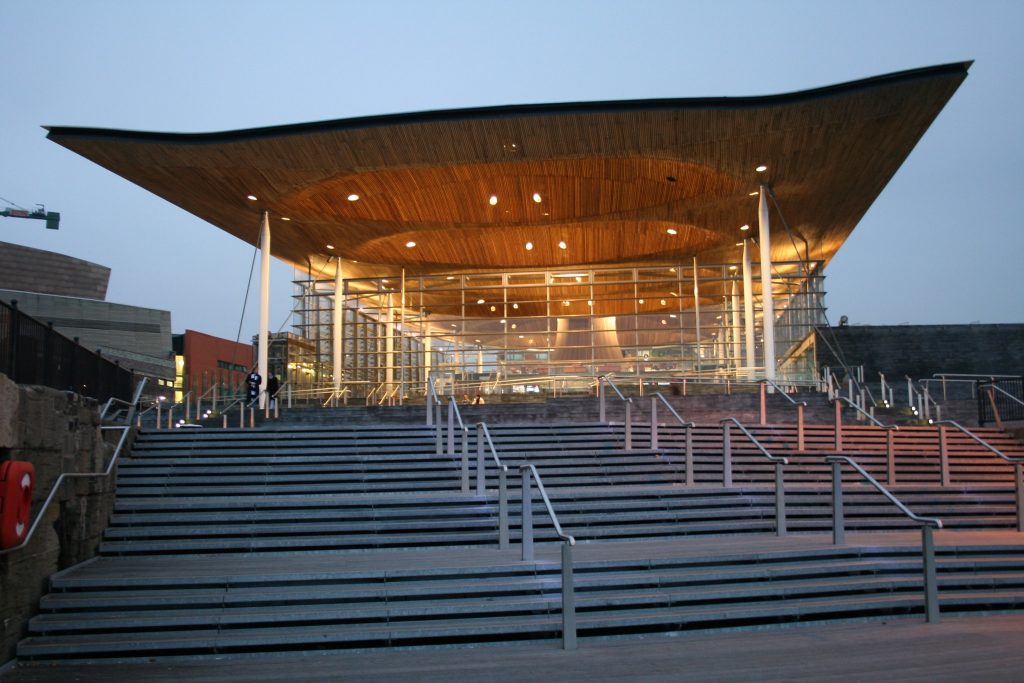The political parties responded to our ‘Big Questions’ on the economy – now the IWA analyse what their answers mean for Wales.
The IWA has been undertaking research, analysis and engagement over the last five years to develop practical ideas to make a successful, clean, green, and fair economy for Wales.
We have developed a set of priorities rooted in this work. Focussing on the potential for Renewable Energy, the Foundational Economy, and crucial reforms to how economic policy is made and implemented post-Brexit.
The economy is a broad topic, and we aren’t seeking to create a comprehensive document on all aspects of economic policy.
Our Economic Priorities for the Next Welsh Government report outlines the detailed, practical recommendations in these key areas, which we believe the next Welsh Government should take forward.
We recognise the important work being done by other organisations to highlight other important economic issues, particularly tackling poverty and inequality, and the impact of Covid-19.
We asked the parties standing in the 2021 Senedd elections specific questions around our priorities; and you can read their responses here. Below is an analysis by the IWA team of the responses received.
1) The IWA has previously shown how an ambitious target of 100% renewable energy by 2035 could deliver a low carbon stimulus for Wales’ economy, and most parties are calling for a ‘green recovery’ post-Covid 19.
How will your party’s policies ensure this vision becomes a reality? And how will you ensure communities across Wales feel real benefits?
There can be no doubt there has been a step change in the political commitment to renewable energy over the five years since the last Senedd elections.
There are some welcome common themes in the party’s responses to the challenge laid down by Re-energising Wales. The major gap remains in the how of delivery, and ensuring the resourcing and expertise is in place to make it a success.
Low Carbon homes
Four of the five parties have put upgrading Wales’ homes to modern energy efficiency standards front and centre. We would like to see this go further, and emphasise the potential for Wales to go for a first mover advantage for its construction sector.
The next Welsh Government will need to think beyond new and existing homes in Wales, and make its ambition for Welsh firms to be building and upgrading low carbon homes in England, Scotland and beyond to maximise the economic benefits.
“Any electric vehicle programme should prioritise schemes that promote shared ownership, to avoid under usage of vehicles and reduce congestion.”
Creating jobs
Re-energising Wales identified the potential for just over 20,000 new jobs to be created across seven specific sectors, if our recommendations were followed.
Parties are promising their policies will deliver anything between 15,000 to 60,000 jobs, and both Welsh Labour and the Welsh Conservatives have placed a welcome emphasis on marine technologies.
It is crucial that jobs in energy specifically are premised on what the future market will look like – characterised by flexibility, storage and smart technology. The ambition for jobs must be matched by a commitment to deliver the technical skills the sector needs.
This will mean continuing to work more closely with BEIS, Ofgem, and consumer bodies to draw on their insights into the future energy market and system.
Transport
Nearly all parties have mentioned the role of transport in contributing 13% of Wales’ carbon emissions, and emphasised noticeably different policies to reduce this.
Welsh Labour, the Welsh Liberal Democrats, and Plaid Cymru have emphasised the role of active travel, whilst the Welsh Conservatives have led with a commitment to delivering charging points to support the use of low emission vehicles.
Our Decarbonising Transport paper utilised the sustainable transport hierarchy, working down through: measures that reduce the need to travel; active travel; public transport and finally alternatively fuelled cars.
Reducing the need to travel, public and private transport, as well as active travel options all have a role to play in decarbonising transport.
However, as we noted in our final Re-Energising Wales report, any electric vehicle programme should prioritise schemes that promote shared ownership, to avoid under usage of vehicles and reduce congestion.
The total emissions from transport need to include the manufacture of vehicles, not just usage.
Discussions and debates that drive Wales forward.
Join Wales’ leading independent think tank.
To maximise the economic benefits to Wales of the transition to sustainable transport systems, the next Welsh Government should look to support firms and technologies which will play a part in the low carbon transport sector worldwide in the long term.
Tidal Lagoon
The Swansea Bay Tidal Lagoon symbolises the gap between political ambition and a community’s hopes. The shortcomings of the policy framework at devolved and reserved level have not helped, either.
Welsh Labour and the Welsh Conservatives have both made reference to policies which resurrect the prospect of a lagoon sector. However, a Wales, or UK, lagoon sector only seems feasible if the overall policy framework is changed in two ways.
First, being more comfortable with committing future generations to repaying infrastructure costs incurred today over a longer period. Second, a clear and transparent framework for how renewable subsidies will support economic stimulus.
Recent work by IPPR has shown significant levels of latent support for green jobs amongst people in the south Wales valleys, and a clear desire for government to make it a reality. Indeed, the UK Government has also made green growth a more explicit focus.
However, whilst renewables subsidies remain regressively funded through energy bills, it is difficult to justify spending money meant for decarbonisation objectives on job creation – whether in Swansea or elsewhere.
If job creation is to become the fourth corner of the ‘energy policy trilemma’ (alongside affordability, security of supply, and decarbonisation) then we will not achieve this through a reserved policy framework aimed primarily at controlling cost.
“Public support for a green economic stimulus has never been higher, but that support will falter if the promise does not translate into a reality.”
This new political consensus should lend itself to an improved, much more constructive dialogue between the UK and Welsh Governments about a future subsidy framework to deliver these ambitions in Wales and elsewhere.
Overall there is much to be positive about in all parties’ responses, but it is our view that no party has convincingly set out how it will address the very real delivery gap in Wales.
Public support for a green economic stimulus has never been higher, but that support will falter if the promise does not translate into a reality.
2) The Foundational Economy has become an important lens through which to view economic policy, by investing more in the dependable, local parts of the economy that people value.
Do you agree that these parts of the economy merit greater attention? What will your party do to support growth, social value, and innovation amongst foundational firms and sectors in Wales?
The Foundational Economy has become an important concept within Welsh policy over the last five years, and there has already been detailed engagement with this topic from across the political spectrum.
This has been most notably in the work of the Economy, Infrastructure and Skills Committee, through a number of debates in the chamber, and the rich debate that is happening outside of the Senedd across public and civic society.
The responses demonstrate a healthy divergence of views and proposed approaches, and the parties have each put their own mark on a policy agenda that looks as though it is here to stay.
With debate on the topic likely to continue whoever is in government after May’s election, we have highlighted a few emerging themes.
Give and take
There is evident agreement across the parties that firms in the foundational economy are deserving of government support.
All parties propose a mixture of levers to tweak the business environment to provide advantage to firms that are seen as offering something of social value.
Nonetheless, differences in emphasis belie the parties’ different visions of how government works.
The key divergence is between what government gives (in terms of procurement opportunities) and what it takes away (in terms of tax).
“The devolution settlement was never really designed with economic policy in mind.”
All parties recognise the potential of directing more public procurement towards local firms, but Welsh Labour, Plaid Cymru and the Green Party all emphasise the role of policy frameworks, targets and legislation in effectively shaping markets.
At the other end, the Welsh Conservatives emphasise government getting out of the way by reducing the tax burden through a generous offer of taking small business out of the non-domestic rates system.
The proposal to cover employers’ NI for two employees for a period of two years could see this investment reaching beyond business owners by boosting employment.
Both of these sets of solutions leave some questions to be answered. Placing restrictions on public procurement will likely require significant investment in the procurement profession, as identified by the EIS committee and by the Future Generations Commissioner.
Similarly, generous reductions in taxes for businesses will require careful costing (business rates represent up to 6 per cent of the Welsh Government’s budget), and could place pressure on local authorities who, over the next five years, will quite simply have nothing left to cut according to the Wales Governance Centre.
In putting these plans into practice, there is also a need to be aware of the potential for gaming.
Robust debate and agenda-setting research.
Support Wales’ leading independent think tank.
Providing advantages to firms who are ‘local’ or ‘small’ can encourage businesses to potentially restructure or change their business address.
Firm size and location are proxy measures of what makes up a ‘socially valuable’ firm, but they are not definitive. Nonetheless, there is clearly a growing evidence base that can inform the next Government’s actions in managing these risks.
What’s missing?
The approaches outlined above emphasise what could be considered the ‘hard’ levers of Welsh Government economic powers – taxing and spending.
Nonetheless, as we have pointed out in the past, the devolution settlement was never really designed with economic policy in mind. This is despite it being an important issue for many Welsh voters.
In place of a ‘Chancellor’ type role that shapes the macroeconomic environment year on year, the Welsh Government’s powers offer potential for the use of ‘soft’ levers that can promote long term transformation in some of Wales’ economic fundamentals – skills, innovation and relationships within and beyond Wales.
As our ongoing work on the foundational economy is proving, these are the mechanisms through which the Welsh economy in general will sink or swim in the future.
The Welsh Liberal Democrats have highlighted the era-defining challenge to Welsh Research & Development posed by the loss of European funding – a situation that has often gone under the radar in debates about the UK’s future outside the EU.
Vocational education is entirely devolved, but it’s hard to avoid the conclusion that it is not seen as a part of economic development.
Talking to researchers, business owners, officials and policy makers, it becomes clear that many of the good news stories of the Welsh economy have come about through careful negotiations and relationship building, making use of structures like Business Wales and the Development Bank of Wales. They have not necessarily come about through cash transfers.
The future operation of these structures is likely to be an election issue, as Plaid Cymru and the Welsh Conservatives have both separately proposed new arms-length bodies and delivery agencies.
“We are troubled by the constitutional and practical implications of the Internal Market Act.”
We would have hoped to see these feature more prominently in the parties’ election pitches, but this situation is nothing new. As far as elections are concerned, parties want to be able to tell a big story: tens of thousands of jobs (‘green’ or otherwise), a hundred thousand apprenticeships, hundreds of miles of road and rail stretching across the country.
However, if the next Welsh Government fixates on the big numbers and doesn’t find a way to improve our capacity to adapt, as well as shoring up our fundamentals, these kinds of big investments may prove to be roads to nowhere, creating jobs that leave as quickly as they came.
3) Wales has previously benefited from EU structural funds, at both a local and national level. These funds now look likely to be administered by the UK Government, and Wales will need to get the structures right so it can compete with other parts of the UK to secure them.
How will your party ensure Wales makes successful bids into this new UK wide framework?
The IWA remains deeply concerned about the reform of the UK’s structural funding framework post Brexit. We are troubled by the constitutional and practical implications of the Internal Market Act, and the proposed approach to delivery of the Shared Prosperity and Levelling Up funds.
These reforms are not in the spirit of devolution, which is the legal, political, democratic and cultural reality of the UK in 2021 – and advocating devolution as a model is foundational to the IWA’s existence.
The reforms also do not follow the template of successful practice in regional economic development in other nations.
Nations which have lower levels of regional inequality usually also have settled constitutional structures characterised by an autonomous regional (in the socio-economic and geographical sense) bodies with adequate decision making power, and sufficient local knowledge to make effective decisions. Examples are the Länder in Germany, and the Départements in France.
Innovative. Informed. Independent.
Your support can help us make Wales better.
It is clear that Welsh Labour, Plaid Cymru, the Welsh Liberal Democrats and the Wales Green Party share these concerns in different forms, though we note the Welsh Conservatives’ commitment that Wales is ‘guaranteed to receive at least the same level of funding as we currently receive from the EU’.
However, it is not clear by what means this will be achieved. Control of the Shared Prosperity Fund and Levelling Up Fund ultimately rest with the UK Government, and distribution throughout the UK will be informed by competitive bidding.
Commentary by the Institute for Fiscal Studies implies that it is very unlikely that West Wales and the Valleys will receive the levels of funding they were receiving in the past.
There does not appear to be any mechanism to determine a Wales-wide pot from the Levelling Up Fund (which will make up approximately £1.2bn per annum, equivalent to half of what the UK received through European structural investments).
The fund’s criteria have seen a number of areas of Wales, particularly in north west Wales, downgraded in terms of their priority status compared to ERDF/ESF.
It therefore appears to be less than certain that Wales will receive funding at the same levels.
What is clear is that this vital investment is too important to be allocated in a way which maximises any party’s electoral interests. We can only hope for a more measured dialogue between the Welsh and UK Governments outside the pressure cooker of an election period.
“Longer term alternatives may have merit, but Wales cannot afford to miss out on this funding in the short to medium term.”
However, the substance of our question fundamentally accepts that this new framework, for better or worse, is the new reality for structural funding in Wales.
If Wales is to see comparable levels of funding to what it had before Brexit, and if that funding is to be spent effectively then the next Welsh Government will need to pivot to a convening role, coordinating and supporting bids from local authorities into this new framework.
We need to see detailed proposals from all parties about how they will achieve this, which will be acutely important in the post Covid period. Longer term alternatives may have merit, but Wales cannot afford to miss out on this funding in the short to medium term.
4) Economic development and environmental sustainability can no longer be treated as two separate areas of policy. Our economy must be clean, green and fair – but we will only achieve this if it is successful and delivers prosperity.
To unite these objectives, we believe these policy aims must sit in a single ministerial portfolio – encompassing economy, energy, transport and the environment. How would your government ensure these priorities complement each other?
No party has made an explicit commitment to uniting these priorities within a single ministerial portfolio, and we recognise that this is unlikely in a pre-election period.
We therefore intend to revisit their responses to this question more closely immediately after the election, especially in the event of a hung Senedd and any subsequent negotiations around forming a government.
What is clear is that the current structure is not driving joined up decision making and strategy within government, and current structures must at the very least evolve to reflect this new priority.
All articles published on the welsh agenda are subject to IWA’s disclaimer.
——–
With thanks to Jack Watkins, Hywel Lloyd, and Harry Thompson for their contributions to this analysis.





